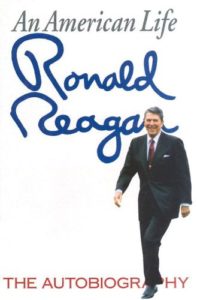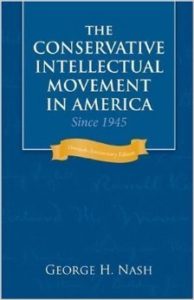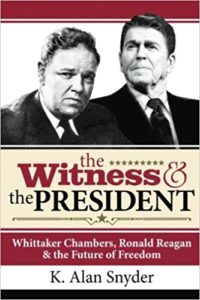Finals week is upon my students and me. Another semester nears an end. Naturally, I am relieved, but I do enjoy the teaching. When students ask which courses are my favorites, I have to say I like them all. Yet there are some that usually stand out because of my particular interests: my course on C. S. Lewis is one, as is the course on Whittaker Chambers.
 Then there’s the one I just completed called “Ronald Reagan and Modern American Conservatism.”
Then there’s the one I just completed called “Ronald Reagan and Modern American Conservatism.”
That course has two purposes: first, to highlight the life and accomplishments of the man I believe to be the best president of the 20th century; second, to understand him within a movement of modern conservatism, of which he was the prime example, exemplifying the various strands that comprise the movement.
To understand Reagan the man, as well as the president, I have students read his autobiography. It reveals what motivated him to aspire to the highest office in the land. They are pleased to learn about his Christian faith.
This course, though, is more than a simple biography of one man. It describes how some men and women responded to the drift in America toward the idea that government can manage our lives better than we can, as well as the cultural drift away from traditional moral principles (which most of them found in the Bible).
 The most comprehensive book to deal with this rising movement after WWII is George Nash’s masterful work, The Conservative Intellectual Movement in America Since 1945.
The most comprehensive book to deal with this rising movement after WWII is George Nash’s masterful work, The Conservative Intellectual Movement in America Since 1945.
It can be a tough read in some spots, as my students earnestly inform me, but it’s also an essential read.
Nash shows how modern American conservatism built on a philosophical basis, not merely as an emotional reaction to liberalism, socialism, or communism. Instead, it had bedrock principles that formed the core of a movement that eventually landed Reagan in the White House.
 In addition to those two books, I offer selections from my own study of Reagan and Whittaker Chambers (yes, he figures in this course also).
In addition to those two books, I offer selections from my own study of Reagan and Whittaker Chambers (yes, he figures in this course also).
My goal is to help these students grasp that conservatism has a good history. True conservatives are bound by the concept of the rule of law, they hold to the tenets of the Constitution, and they realize the necessity of a firm spiritual/moral grounding for our government to function properly.
I also hope they come away from the course with an ability to discern what genuine conservatism is in our day and what is not all that genuine. I don’t want them to fall in line with something trendy that may pass itself off as conservative when, in fact, it’s much closer to populist demagoguery.
My mission from God, if I were to put it in those terms—and I do—is to provide them with truths that will become the anchor of their lives and will stay with them to the end. This course helps achieve that goal.
I sincerely hope that everything I teach leads my students toward faithfulness to God and His purposes in their lives. He has given me this privilege—and this responsibility—and I do not take it lightly.
